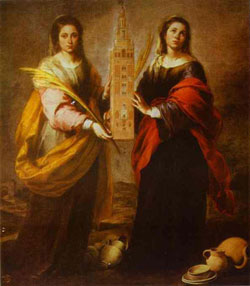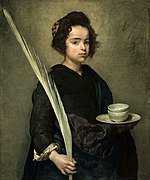
Feastday: July 19
Patron: of Seville; potters; guilds of alfareros (potters) and cacharreros (sellers of pottery)
Death: 287
St. Justa and St. Rufina, Virgins and Martyrs (Feast - July 19) These martyrs were two Christian women at Seville in Spain who maintained themselves by selling earthenware. Not to concur in idolatrous superstitions, they refused to sell vessels for the use of heathen ceremonies and when the worshipers broke up their stock-in-trade, Justa and Rufina retorted by overthrowing the image of a false goddess. Whereupon the people impeached them for their faith before the governor. The prefect, after they had boldly confessed Christ, commanded them to be stretched on the rack and their sides to be torn with hooks. An idol was placed near the rack with incense, that if they would offer sacrifice they should be released; but their fidelity was not to be shaken. Justa died on the rack; the judge ordered Rufina to be strangled, and their bodies to be burned. They are greatly venerated in Spain, and no doubt their names represent historical martyrs in that place. But their Acts are unreliable and one of the martyrs appears to have undergone a change of sex in the course of the ages, for Justa was originally called Justus.
Venerated as martyrs "Saint Rufina" redirects here. For the Roman martyr with this name, see Rufina and Secunda.Saints Justa and Rufina (Ruffina) (Spanish: Santa Justa y Santa Rufina) are venerated as martyrs. They are said to have been martyred at Hispalis (Seville) during the 3rd century.
Only St. Justa (sometimes "Justus" in early manuscripts) is mentioned in the Martyrologium Hieronymianum (93), but in the historical martyrologies Rufina is also mentioned, following the legendary Acts. The two saints are highly honored in the medieval Hispanic liturgy (also known as Mozarabic Liturgy, although this rite was also practised in Visigothic Spain).
La Seo Cathedral (Zaragoza) contains a chapel dedicated to Justa and Rufina. Agost, in Valencia province, is the location of a hermitage dedicated to these saints (Ermita de Santa Justa y Rufina), built in 1821. Toledo also has a church dedicated to them.
Legend
Their legend states that they were sisters and natives of Seville who made fine earthenware pottery for a living, with which they supported themselves and many of the city's poor. Traditionally, they are said to have lived in the neighborhood of Triana. Justa was born in 268 AD, Rufina in 270 AD, of a poor but pious Christian family. During a pagan festival, they refused to sell their wares for use in these celebrations. In anger, locals broke all of their dishes and pots. Justa and Rufina retaliated by smashing an image of Venus.
The city's prefect, Diogenianus, ordered them to be imprisoned. Failing to convince them to renounce their faith, he had them tortured on the rack and with iron hooks. This method also having failed, they were imprisoned, where they suffered from hunger and thirst.
They were then asked to walk barefoot to the Sierra Morena; when this did not break their resolve, they were imprisoned without water or food. Justa died first. Her body, thrown into a well, was later recovered by the bishop Sabinus. Diogenianus believed that the death of Justa would break the resolve of Rufina. However, Rufina refused to renounce her faith and was thus thrown to the lions. The lion in the amphitheatre, however, refused to attack Rufina, remaining as docile as a house cat. Infuriated, Diogenianus had Rufina strangled or beheaded and her body burned. Her body was also recovered by Sabinus and buried alongside her sister in 287 AD.
Patronage
Patronage is especially strong in Seville. According to tradition, they are protectors of the Giralda and the Cathedral of Seville, and are said to have protected both during the Lisbon earthquake of 1755.
In art
 Saint Rufina, by Velázquez
Saint Rufina, by Velázquez
 Saint Rufina, by Zurbarán
Saint Rufina, by Zurbarán
Justa and Rufina were a popular subject for Spanish artists.
A 1540 retable is the earliest known piece of artwork depicting these two saints.[1] A painting of the saints was done by Francisco Camilo in 1644. Goya[2], Murillo, and Zurbarán also painted these saints.
A 1989 painting is a modern interpretation of these saints.[3]
Their feast day is 19 July. During the Middle Ages their feast was celebrated in the Iberian Peninsula on 17 July, as attested by calendars of the time, such as for example by that in the Antiphonary of León.





